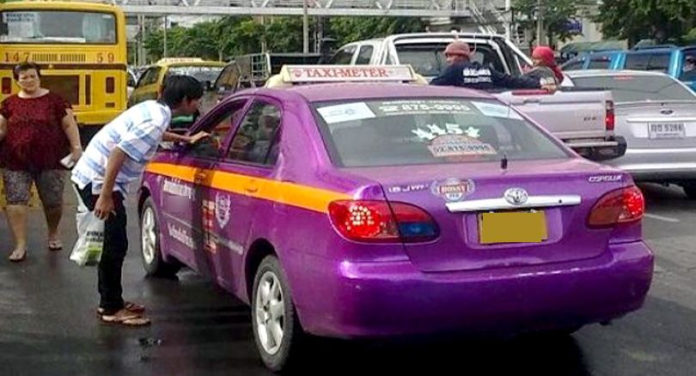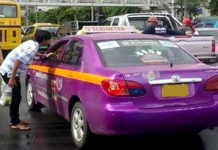Fewer conventional taxis are expected to remain in service if the Transport Ministry has its way with its draft ministerial regulation allowing the use of private cars for ride-hailing taxi services via apps.
Drivers or owners of conventional taxis carrying yellow number plates, which signify their status as public transport vehicles, are likely to switch to driving their own cars instead, according to Vithoon Naewpanich, president of the Thai Taxi Network Association.
His comment came after the cabinet this week approved a draft regulation allowing the use of private cars for ride-hailing taxi service via apps. The regulation would be a boon for GrabCar drivers who have provided the service without proper legal status for years.
Under the regulation, vehicles equipped with up to seven seats that are now registered as personal cars can double as taxis.
The Transport Ministry said the change is expected to be finalised in about a month from now.
On Wednesday, Mr Vithoon cried foul over the move, saying it amounted to the government capitulating to pressure from illegal ride-hailing taxi services.
At the same time, yellow-plate taxis feel they are being punished for complying with the law. They registered legally and invested heavily to provide their service only to be put at risk of losing out to rivals, Mr Vithoon added. (continues below)
There are about 80,000 yellow-plate taxis. Currently, only about 30,000 are in service because the Covid-19 pandemic has sapped demand.
“Taxi drivers feel they are being bullied by the draft regulation,” he said.
Even though he agreed with the deputy government spokeswoman, Traisuree Taisaranakul, that consumers will have greater choice, Mr Vithoon said the draft regulation spoke volumes about the government’s inability to right a wrong. He said it chose instead to pander to those who failed to comply with the law.
He said if the regulation takes effect, many yellow-plate taxis will turn to driving ride-hailing taxis with black number plates for a living. By contrast, the yellow-plate taxis are subject to a rigorous registration process.
Yellow-plate taxi drivers are not happy with the regulation but they cannot gather to protest due to Covid-19 restrictions.
Giving ride-hailing taxis legal status where they can freely pick up passengers will hurt the already dwindling income of the yellow-plate taxi drivers, Mr Vithoon added.
These taxis also operate their own hailing app, which shows they try to keep up with innovation and improve their service, he added.
Under the regulation, drivers are required to obtain a public transport driving licence, pass a criminal background check by the Royal Thai Police and use taxi-hailing apps certified by the Transport Ministry.










































